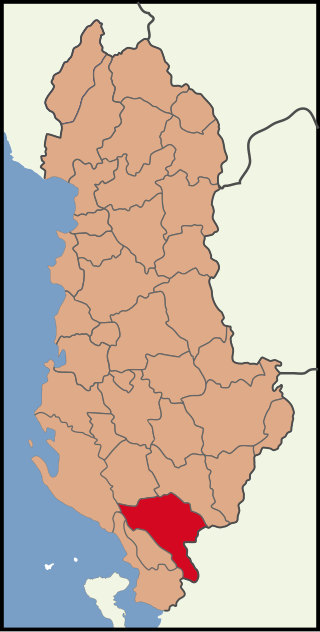
Gjirokastër District was one of the 36 districts of Albania, which were dissolved in July 2000 and replaced by 12 counties. It had a population of 55,991 in 2001, and an area of 1,137 km2 (439 sq mi). It contained a large Greek ethnic minority. It is in the south of the country, and its capital was the city of Gjirokastër. Its territory is now part of Gjirokastër County: the municipalities of Gjirokastër, Dropull and Libohovë.

Gjirokastër County is one of the 12 counties of Albania. The total population in 2021 was 58,031, in an area of 2884 km2. Its capital is the city Gjirokastër.

Finiq is a settlement, considered a town or village, and municipality in Vlorë County, in southern Albania located 8 km from the Ionian Sea and 20 km north of the Greek border. It was formed at the 2015 local government reform by the merger of the former communes Aliko, Dhivër, Livadhja, Mesopotam, and Finiq itself. It is inhabited by ethnic Greeks and is one of two municipalities in Albania in which Greeks form a majority, alongside Dropull. The seat of the municipality is the village Dërmish. The total population is 10,529, in a total area of 444.28 km2.
Lunxhëri is a region in the Gjirokastër County, Albania. It is an ethnographic region along with neighboring regions such as Kurvelesh, Zagoria, Dropull. It is in the periphery of a wider ethnographic region known as Labëria, though its population is said to be non-Lab. Many of its native inhabitants prefer for Lunxhëria to be identified instead as Tosk, as are neighboring regions to the east such as Dangëllia and Kolonja, rather than Lab; some researchers instead prefer to view Lunxhëria as a "transitory region" that is linguistically part of Labëria but culturally part of Toskëria. Lunxhëria is predominantly inhabited by Albanians, but also has Greek and Aromanian minorities.
Dropull i Poshtëm is a former municipality in the Gjirokastër County, southern Albania. At the 2015 local government reform it became a subdivision of the municipality Dropull. The population at the 2011 census was 2,100. The municipal unit is inhabited by ethnic Greeks.
Dropull i Sipërm is a former municipality in the Gjirokastër County, southern Albania. At the 2015 local government reform it became a subdivision of the municipality Dropull. The population at the 2011 census was 971. The municipal unit is inhabited by ethnic Greeks.

Qestorat is a community of the former Lunxhëri municipality in the Gjirokastër County, southern Albania. At the 2015 local government reform it became part of the municipality Gjirokastër.
Kakavijë is a community in the Gjirokastër County, southern Albania. At the 2015 local government reform it became part of the municipality Dropull. The village lies near the border crossing of Kakavia/Kakavijë, and is part of the Dropull region. It is inhabited by members of the Greek minority.
Derviçan is a settlement in the former Dropull i Poshtëm municipality, Gjirokastër County, southern Albania. At the 2015 local government reform it became part of the municipality Dropull. It is within the larger Dropull region. The village is inhabited solely by Greeks.
Frashtan is a settlement in the former Dropull i Poshtëm municipality, Gjirokastër County, southern Albania. At the 2015 local government reform it became part of the municipality Dropull. It is within the larger Dropull region.
Glinë is a settlement in the former Dropull i Poshtëm municipality, Gjirokastër County, southern Albania. At the 2015 local government reform it became part of the municipality Dropull. It is within the larger Dropull region. It is inhabited by members of the Greek minority in Albania.
Goranxi is a settlement in the former Dropull i Poshtëm municipality, Gjirokastër County, southern Albania. At the 2015 local government reform it became part of the municipality Dropull. It is within the larger Dropull region.
Koshovicë is a village in Gjirokastër County, southern Albania. At the 2015 local government reform it became part of the municipality of Dropull. It is inhabited solely by Greeks.
Pepel is a village in Gjirokastër County, southern Albania. At the 2015 local government reform it became part of the municipality of Dropull. It is inhabited solely by Greeks.

Zervat is a village in Gjirokastër County, southern Albania. At the 2015 local government reform it became part of the municipality of Dropull. It is inhabited solely by Greeks.
Kordhocë is a village in the Gjirokastër County in Albania. At the 2015 local government reform it became part of the municipality Gjirokastër. It is known for the Kordhocë bridge.
Vrisera; romanized: Vryserá/Vriserá) is a village in Gjirokastër County, southern Albania. At the 2015 local government reform it became part of the municipality of Dropull.
Grapsh is a village in Gjirokastër County, southern Albania. At the 2015 local government reform it became part of the municipality of Dropull. It is inhabited solely by Greeks.
Llongo is a village in Gjirokastër County, southern Albania. At the 2015 local government reform it became part of the municipality of Dropull. It is inhabited solely by Greeks.

On 16 June 2014, around 800 heavily armed Albanian police officers began a large scale raid in the mountain village of Lazarat, targeting cannabis growers, as part of a nation-wide operation to quell illegal cannabis plantations. Armed drug gang members responded with fire from automatic rifles, RPG-7s and mortars. After a four-day siege, the police captured Lazarat and its surrounding fields. Fourteen villagers and mafiosos were arrested. No fatalities were reported. Following the capture of the village, the police destroyed around 91,000 cannabis plants.










